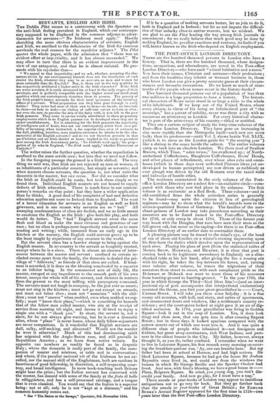THE POST-OFFICE LONDON DIRECTORY.
THERE are five hundred thousand persons in London who have a history. That is, there are five hundred thousand, whose designa-
tions, occupations, and whereabouts, are noted in the Post-office London Directory—who have each " a local habitation and a name." You have their names, Christian and surname—their professions ; and from the localities they inhabit or transact business in, those who know London can give a pretty accurate guess at their circum- stances and favourite recreations. Do we know as much of nine- tenths of the people whose names occur in the history-books ? Five hundred thousand persons out of a population of less than two millions is a large proportion to have a history. The histori- cal characters of Rome never stood in so large a ratio to the whole ofits inhabitants. If we keep out of the United States, where every citizen, in virtue of his being an infinitesimal part of "the
sovereign," has a patent of nobility, never was there a city with so numerous an aristocracy as London. For every historical charac- ter is part of the aristocracy of his country—titled or untitled.
They are a curious subject of study the forty-nine volumes of the Post-office London Directory. They have gone on increasing in
size more rapidly than the Metropolis itself—each new one more bulk) than its predecessor—until Vol. I. shows beside Vol. XLIX. (which is to serve as the London guide for "the ensuing year") like a shrimp in the sauce beside the salmon. The earlier volumes carry us back into an obsolete London. We there read of Swallow Streets, which Time, " edax rerun)," has swallowed up ; of North- umberland Coffeehouses, Slaughters Coffeehouses, Boars' Heads, and other places of refreshment, over whose sites cabs and omni- buses (which in those days were unfleshed Platonic ideas yet un- developed to human perception) are now driven as ruthlessly as ever plough was driven by the old Romans over the razed walls and bulwarks of hostile cities.
The residents enumerated in the early volumes of the Post- office London Directory are a select few—an exclusive circle—com- pared with those who now find place in its columns. The first volume is as recherche as a Red Book. These volumes—and in old-established firms the whole unbroken series is generally to be found—may serve the citizens in lieu of genealogical
registers—may be to them what the herald's records were to the sixteen-quartered Barons of Germany. The families of the mer-
chant-princes of London may take precedence according as their ancestors are to be found named in the Post-office Directory for 1756, or only creep in about 1784. Those of the former year
may boast with the Douglas, that men have seen their stem as the full-grown oak, but never as the sapling—for there is DO Post-office London Directory of an earlier date to contradict them.
A pleasing picture may be traced to the mind's eye, of the head of one of those old families on a winter's evening impressing upon his first-born the duties which devolve upon the representatives of such sires. Placing his glass of port (from the statistical tables of
Messrs. SHAW, MAXWELL, and 1.1EAPHIC, it is clear that port is combs, back to its legitimate ascendancy in England) on a slim-
shank:it table at his left hand, after giving the fire a rousing stir with his right, he takes the boy between his knees, and, turning over volume after volume, he traces the migrations of their ancestors from street to street, with such complacent pride as the
Delaware or Mohawk was wont to trace those of his ancestors from hunting-ground to hunting-ground. " In the year 1760, the
year in which George the Third—God bless him !—(and an inter- jectional sip of port accompanies this interjectional exclamation) mounted the throne, you find your great-grandfather in — Court, Cannon Street. I will take you there some holyday : it is a fine
roomy old mansion, with hall, and stairs, and suites of apartments, and ornamented doors and windows, like a nobleman's country re-
sidence; and the court-gates locked at night gave it an air of dig- nified seclusion. In 1784, your grandfather was living in Golden Square—look it out in the map of London. Yes, it does look dingy and close now, that one gets into it after crossing Regent
Street ; but in those days it looked spacious compared with the narrow streets out of which one went into it. And it was quite a different class of people who inhabited it—not foreigners and
tiddlers, but great army-contractors, rich West Indians, and part- ners in the oldest houses in the City. My father, however, always thought it, as you do, rather confined. I remember when we went
to live in Leicester Square, his first remark every morning on enter- ing the breakfast-parlour was, Ay, one can breathe here.' But my father had been at school at Harrow, and had high notions. He liked Leicester Square, because he had got the house Sir Joshua Reynolds once lived in, and could see from the windows the houses in which Sir George Saville and the Speaker Onslow had lived. And now, with God's blessing, we haves good house in Place, Belgrave Square. So mind, you young dog, you don't dis- credit your family. And now go play, for I must have a nap." These annals or year-books of London may appear to fastidious antiquarians not to go very far back. But they go further back than the annals or year-books of Great Britain ; for EDMUND BURKE'S Annual Register appeared for the first time in 1758—two years later than the first Post-office London Directory.


























 Previous page
Previous page